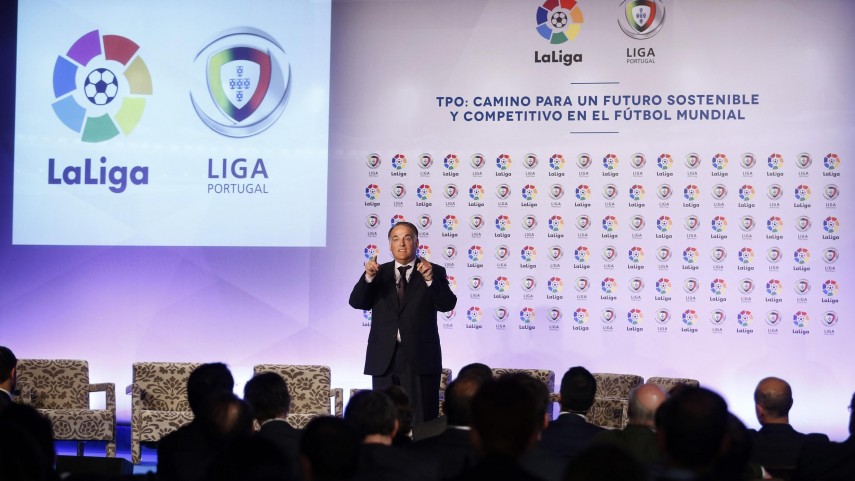Nota de Prensa
LUN 20.07.2015
As required by the CSD (the high Spanish sports council), and with the aid of a report prepared by LaLiga, the CNMC (the Spanish national commission that rules on markets and competition) ruled in favour of the legality of investment funds in Spain on the 2nd of July. The decision recognises that the banning of investment funds in football would be unconstitutional. LaLiga received the mandatory report from CNMC with great satisfaction and endorsed the conclusions reached by the Spanish body.
Since last December when FIFA prohibited the participation of third parties in the rights to the earnings of football players, a measure known as TPO ("Third Party Ownership"), LaLiga has taken an active stand against this decision by taking the necessary legal action to oppose it. The mandatory report from the CNMV regarding “the banning of the ownership of the rights to the earnings of football players by third parties” strengthens LaLiga's position in favour of TPOs.
According to the ruling from the CNMC, the banning of the TPO “infringes upon the freedom of business within the framework of a free-market economy guaranteed and protected by Article 38 of the Spanish Constitution of 1978”. Similarly, “fundamental freedoms enshrined in the EU Single Market, established by the TFUE, are violated, as would be the free movement of capital (article 63), with repercussions also for the freedom of movement of workers (article 45)”. The same Competition report states that this prohibition is “detrimental for football, both for the competition as for the clubs and professionals involved. The slightest remuneration and generation of talent would imply lesser competitiveness and quality in the sector, leading to an undermining of the well-being of the consumer”.
This decision, reached by a Spanish organisation, ratifies the view held by LaLiga about the legality of investment funds. Last April, during the celebration of the TPO Forum in Madrid focussing on “The path to a sustainable and competitive future for competitive world football”, Javier Tebas President of LaLiga underlined the important role of national legislation in the process. He emphasised: “If we do not react, and the TPO is a major case in point, if we do not defend the national legislation that allows us access to these systems of finance, professional football will end up highly localised. We need investors, we need to share risks. We must attract talent to be competitive.”
For their part, the Portuguese Liga (LPFP) evaluated the CNMC decision very positively: “The LPFP wish to express their enormous satisfaction with the position taken by the Spanish authorities in their statements regarding the TPO. It is necessary to note that in Portugal the question of legality or non-legality was not posed owing to the fact that the taxation administration ruled in 2011 in favour not only of recognition of the TPO but also of their legality and of specific taxation measures”.
Voices of great prestige have publicly supported this vision. Clubs such FC Oporto, FC Twente, SL Benfica or CR Flamengo spoke up for the legality of the TPO at the TPO Forum in Madrid. Miguel Angel Gil Marin, advisor and delegate of Atletico de Madrid, stated that "TPO has to be regulated, but never banned. In our case, investment funds have allowed us to get the team competing, and we have increased our revenue. If we are here, it is thanks to the support of TPO. If we continue on the same path of prohibition, each club will have to look for an alternative". In the same vein, Jesus Arroyo, deputy general director of Sevilla FC, commented: "It's illogical to ban the inflow of capital. Not allowing clubs to play with these tools isn't reasonable. It isn't a question of modern slavery, what has to be banned are certain practices and abuses".
CNMC’s ruling is only one more step forward in the fight. Last February LaLiga, along with the Liga Portuguesa (LPFP), denounced the agreement adopted by FIFA before the European Commission's Department of Competencies banning TPOs. Both organisations argued in great detail that this ban infringed upon the rules in defence of competencies outlined in the TFUE (Treaty on the Functioning of the European Union) and constituted an economic agreement that limits the financial freedom of clubs, players and third-parties and is unjustified and disproportional. This ban will prejudice clubs, particularly those lower-income clubs, disallowing them from sharing the financial rights of their professional players with third parties and limiting their power of discretion in the management of their financial obligations. LaLiga and the LPFP trust that the European Commission will act on this issue with speed, initiating the necessary legal sanctions against FIFA and annulling the ban issued against the TPO.
Doyen Sports, a private capital fund that offers financial assistance to football clubs, also presented a complaint to the Belgian national justice system with the intention of revoking the FIFA ban. In agreement with the view of LaLiga Doyen Sports believes that the FIFA ban, effective since the 1st of May, will deprive clubs of a sustainable and realistic source of financing. The end result, they say, will be a major imbalance in competitiveness that will favour the world's wealthier clubs.
© LALIGA - 2015
